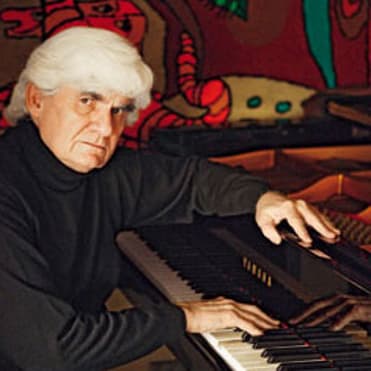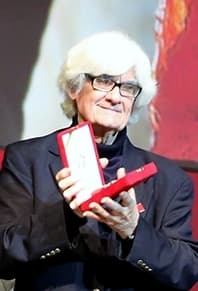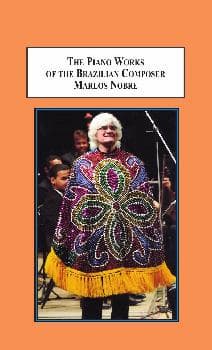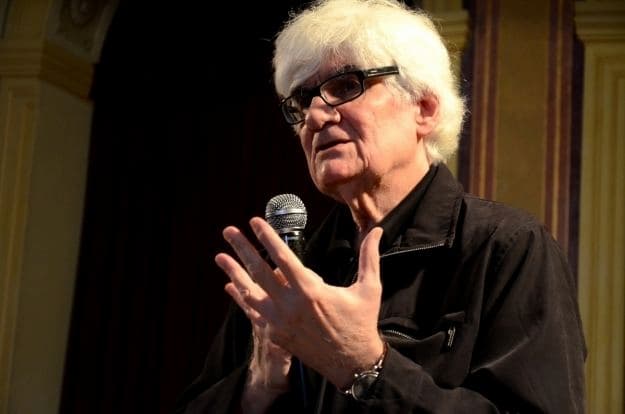My birthday is on the 18th of February. I don’t celebrate my birthday much, but I reflect, think, and stay curious. My curiosity led me to explore if other classical musicians were born on the 18th of February. The answer is yes, and there are quite a few. Here is one of them.
Marlos Nobre (Feb 18, 1939-)
Marlos Nobre Performs his Frevo No. 2 for piano
Known as one of the most important and creative composers in the Iberoamerica world, composer Marlos Mesquita Nobre de Almeida is a creator whose music demonstrates originality and reveals his Brazilian roots. Throughout his career, Nobre has won more than thirty national and international awards, including the Guggenheim Fellowship and the Tomás Luis de Victoria Prize (the highest honor given in Spain to a composer of Spanish or Latin American origin). He has also held important positions, serving as president of the Brazilian National Academy and the International Music Council of UNESCO.
Nobre’s Music Teachers

Marlos Nobre
Marlos Nobre was born in Recife, the capital of the Brazilian state of Pernambuco. Living in a busy city, the young Nobre experienced a lot of street music. His first music teacher was his cousin Nysia Nobre, a professional pianist. He took piano and music theory lessons from her and was introduced to music written by Villa-Lobos and Ernesto Nazareth.
In 1948, Marlos Nobre began studying at the Conservatório Pernambucano de Música with Joachim Koellreutter and Camargo Guarnieri, the two major musicians who held extreme opposite aesthetic orientations. In 1959, he was admitted to Recife University, earning a bachelor’s degree in music performance.
Early Compositions

Marlos Nobre at Mérito Cultural 2013 © Wikipedia
During that time, Marlos Nobre wrote Concertino op. 1 for piano and string orchestra and Nazarethiana for piano solo. Both pieces were inspired by the popular style found in Nazareth’s compositions. The last movement of Concertino op. 1 was made into a piano solo version and titled Homenagem a Ernesto Nazareth op. 1a. Nazarethiana, Op. 2 was written a little after Concertino op. 1 and it was awarded the first prize in the National Competition of the German-Brazilian Cultural Society.
Marlos Nobre: Nazarethiana for piano (Daniel Inamorato)
In 1963, he went to Buenos Aires for a post-graduate program; there, he studied with Alberto Ginastera, Olivier Messiaen, Riccardo Malipiero, Luigi Dallapiccola, Bruno Maderna, and Aaron Copland. During that time, Variações Rítmicas op. 15 for piano and Brazilian percussions was written. This piece has a theme followed by 7 variations and a Coda. It combines Brazilian rhythm with serial techniques. Percussion instruments such as atabaques (conga drums), bongos, xocalhos, agogôs, pandeiro, tamborim, and cuíca e reco-reco are used in this piece. Even though it was written in 1963, the world premiere did not take place until 2003 in Buenos Aires.
Marlos Nobre: Variações Rítmicas for Piano & Typical Brazilian Percussion
Nobre’s Most Famous Compositions

Piano Works of the Brazilian Composer Marlos Nobre. A Guide to the Repertoire © mellenpress.com
One of Nobre’s most famous compositions, Ukrinmakrinkrin op. 17 was written and premiered in 1964. Dedicated to Alberto Ginastera, this piece was written for soprano, piano, and woodwind instruments and the texts were based on the Xucuru language, an indigenous language of Brazil. According to the composer, this work was a “lamentation for the suffering of the Indian community “Xucurus” in the Northeast of Brazil, which was destroyed by the white invasion of his land.” Ukrinmakrinkrin won the International Rostrum of Composers of UNESCO in Paris in 1966, and the same year, it was performed in 25 countries.
Marlos Nobre: Passacaglia for Orchestra
Since Ukrinmakrinkrin, Nobre’s music career took off. He was invited to participate and present his compositions at various international music festivals, such as Ludus Instrumentalis op. 34, for chamber orchestra, was premiered in 1969 at the Contemporary Music Festival of Tanglewood, where Nobre was the composer in residence.
Marlos Nobre: Ludus Instrumentalis for chamber orchestra
In addition to composing, Marlos Nobre was a founder of the Sociedade Música Nova (New Music Society) where he served as the conductor of the Conjunto de Música Nova do Rio de Janeiro. Later Nobre was invited to conduct the Royal Philharmonic Orchestra of London at a concert dedicated to his works in the 1990s. One of the pieces performed was Concertante do Imaginário, op.74. Nobre wrote this work in 1989 and premiered as a soloist with the Brazilian Symphony Orchestra the same year. This work was based on the poetry of Cecilia Meireles, and it was dedicated to his wife, Maria Luíza Corke-Nobre, a prominent Brazilian pianist, who gave the world premiere of the final version with the Royal Philharmonic Orchestra of London at Queen Elizabeth Hall.
Marlos Nobre: Concertante do Imaginário
Marlos Nobre as a Pedagogue

© alchetron.com
In the 1990s, Nobre held a few academic positions. He served as visiting Professor at Yale University, the Juilliard School of Music, the University of Arizona, and the University of Oklahoma (1997); he was invited as the guest composer at the University of Georgia, and the Texas Christian University.
One final work I want to share with our readers in this article is called Sonatina. Composed in 1984, this beautiful and peaceful solo piano work was dedicated to the legendary Brazilian pianist Nelson Freire.
For more of the best in classical music, sign up to our E-Newsletter
Marlos Nobre: Sonatina for piano (Clelia Iruzun)
